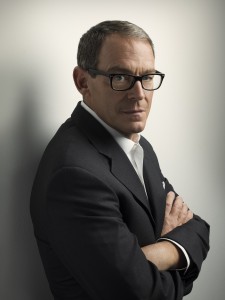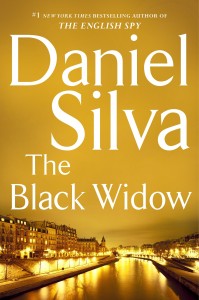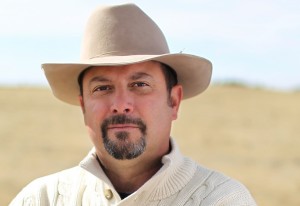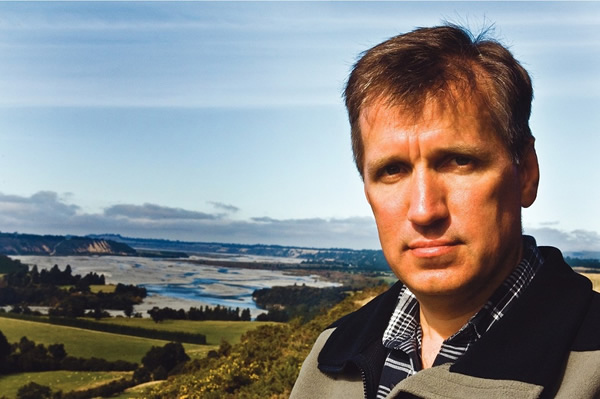Daniel Silva is the international award-winning author of the Gabriel Allon series which has topped the New York Times’s bestseller list many times These books about this art restorer, assassin and spy have been translated into twenty-five languages. Before becoming a novelist, Daniel Silva was the Chief Middle East Correspondent for UPI in Egypt, and the Executive Producer of CNN’s Crossfire.

In The Black Widow, ISIS has detonated a bomb in Paris, and a desperate French government wants Gabriel to eliminate the man responsible before he can strike again. A master terrorist known as “Saladin” is intent upon establishing a new caliphate in the Islamic State, and he will strike throughout the West, including on U.S., soil to reach his goal. Gabriel hatches a daring plan: he will insert an Israeli agent—a woman—posing as a vindictive Palestinian “black widow” into ISIS.
Looking at actual events and the publication date of The Black Widow, it’s clear you wrote about the Paris bombing before last November’s attack. How did it feel to see your own plot element play out in real life?
It felt so terrible that I seriously considered setting the book aside and writing something else. In the end, I chose to pretend the Paris attack in November had not happened in the universe where my characters live and work. The similarities between the attack—the use of bombs and guns, the links to Molenbeek in Brussels—were all written before the actual Paris attack.
I think people like me who’ve been writing about jihadism in Europe and have been watching and listening carefully to ISIS, were not at all surprised by what happened in Paris. We all knew because of the number of foreign fighters who have gone to Syria and who then return to Europe with their European passports which allow them freedom of movement within the EU, that Europe is low-hanging fruit for ISIS.
Everyone who reads international thrillers and spy novels knows about Gabriel Allon. Is it true he was never intended to be a character in an ongoing series?
It’s true. When I wrote about Gabriel in the first book, he was going to appear only in that novel and then quite literally, sail off into the sunset. My publisher at the time, Putnam, wanted another book on Gabriel. My editor was the great Phyllis Graham, and I explained to Phyllis all the reasons why an Israeli continuing character was not going to work. [Laugher] I felt there was too much anti-Israeli sentiment and frankly, too much anti-Semitism in the world for Gabriel Allon to work in a mass market way. No one has been more surprised than I to see an Israeli character appear at the top of the New York Times bestseller list on a regular basis.
What happened after book two?
Well, then came book three. [Laugher] My third book in the Allon series is called The Confessor and I originally conceived that book as a non-Gabriel Allon novel. After the success of that book, I had the sense I had a series going.
What do you think makes Gabriel Allon such an enduring and popular character?
I really think it’s the fact there are two distinct sides to his character. He’s a man of violence, a soldier and assassin, but he’s also an art restorer. His duality allows me to construct my stories in a way that might make them appeal to someone who might not necessarily read spy fiction. I know for a fact that many of my readers really don’t read much else in the genre besides the Gabriel Allon books. I think that’s a testament to the character. He makes the books appealing to a broader range of people. I also think the abundant controversy about Israel and the Middle East gives him a certain heft and significance. It gives him some personal heat because the subject matter is both real and critical. Many historical tides move the character of Gabriel.
The heroine of The Black Widow, Natalie Mizrahi, is a fascinating character. Tell us a bit about her.
Natalie was born and raised in France and is a recent emigre to Israel. She and her family moved there like many thousands of other French Jews to flee the rising tide of anti-Semitism in France. She’s a skilled emergency room physician at Hadassah Medical Center in Jerusalem and happens to speak fluent Arabic. She’s recruited by Israeli intelligence to undertake a mission ‘That no one in their right mind would ever undertake,’ as it’s described in the book.
What would Gabriel Allon say is now the greatest threat to the world arising from the Middle East?
I think he would say ultimately, the threat is twofold.
As an Israeli, he would view the nation-state actors as the biggest threat. I think he would say the prospect of a nuclear-armed Iran in the near future—let’s be clear: it’s only a temporary scaling back of the program that will expire in the blink of an eye in the historical arc of the Middle East—is the biggest threat to Israel and the world.
That said, there’s a sea of instability in the Middle East. Various Middle East factions are fighting each other, and ISIS is now a real threat both regionally and worldwide. The region is a cauldron of unrest. Millions of refugees pouring out of the region have politically destabilized Europe. That’s a consequence of the Syrian civil war with which we’ll live with for a long time. The greatest potential threat to Western security is some sort of radiological or nuclear device being smuggled into an American city. A very senior Israeli intelligence officer said to me, ‘We don’t know what we don’t know.’ We really don’t know the capabilities of ISIS but we should assume the worst, that they will try getting their hands on the most destructive weapons imaginable.
The Black Widow, as do all your novels, has plot twists and explosive turns. Do you usually pre-plan them or do they arise as you write?
It depends on the type of plot twist. For the most part, I don’t write with a structured outline. I have a sense of the story and some touchstones and landing pads before I start, but I begin writing with very little plotted out.
How did you learn so much about intelligence and spycraft as exemplified in The Black Widow and your other novels?
I have read every single major work on the history and practice of intelligence. Then, quite frankly, some of my best friends are spies and I spend a lot of time around them. I don’t go to an Israeli who’s a former spy or intelligence officer and ask ‘How do you do that?’ I can make that stuff up. But I do like to capture their view of the world, their characters, and sense of humor.
What’s the most important lesson you’ve learned about writing?
I always thought the dumbest piece of advice I ever heard was ‘Write what you know.’
I disagree. Write what you’re passionate about. Write what you’re interested in writing. Choose your material; then bury your face in it. I learned not to worry before starting a project. I’ve never quite understood the fear some writers have about beginning a novel. I never fear beginning something; I know I can always fix the book.
The other very important lesson I learned is to try to enjoy the writing of that first novel, because once you’re a published author, it’s never quite the same again. It’s important to make sure you’re doing something that’s a lot of fun to do.
You’re hosting a dinner party and can invite any five people, living or dead, real or fictional, from any walk of life. Who would they be?
Churchill would be there. I’d invite George Orwell who might be coughing and wheezing and not feeling well but I’d love to talk to him. It would be fun to have FDR along with Churchill—to have the two leaders who saved the world sitting at the same table. How about inviting the acerbic Graham Greene? And then, I’d love to have Hemingway join us. Can you imagine the amount of drinking going on with Churchill and Hemingway there? [Laughter]. I’d watch the whole evening explode.
What’s coming next from Daniel Silva?
I haven’t quite decided and I’ve learned a very important lesson: never talk about a book that isn’t written yet. [Laughter]
Congratulations on penning The Black Widow, a page-turning novel exploring the foundation of ISIS, jihad, the Syrian civil war, anti-Semitism in France, and the future of the Middle East.






 James Rollins is more than a thriller author. He’s a veterinarian, a man of science, and writes best-selling novels evocative of Michael Crichton and Isaac Asimov, but with a uniquely imaginative flavor of their own. His novels combine elements of history, scientific fact and speculation with military suspense and threats of global destruction. His books transcend all genres.
James Rollins is more than a thriller author. He’s a veterinarian, a man of science, and writes best-selling novels evocative of Michael Crichton and Isaac Asimov, but with a uniquely imaginative flavor of their own. His novels combine elements of history, scientific fact and speculation with military suspense and threats of global destruction. His books transcend all genres.